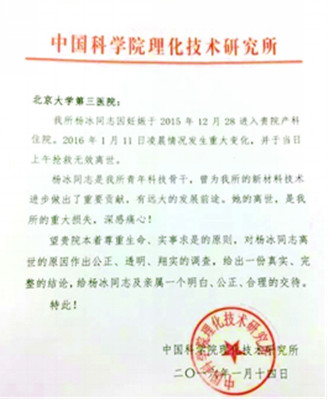Now the news continues.
A dispute has erupted between two of China's powerful medical and scientific organizations after the sudden death of a pregnant employee at one of the groups at a Beijing hospital.
The victim's family was accused by the hospital of destroying hospital property and attacking hospital staff. The victim's husband has denied the accusation.
But while physical altercations over treatment disputes have repeatedly made news, a confrontation between prestigious organizations is rare, if not unprecedented.
The deceased woman, 34-year-old Yang was an employee of an institute under the Chinese Academy of Sciences. She was admitted to Peking University Third Hospital for hypertension on Dec 28.
Yang was 26 weeks pregnant and was in a stable condition after treatment at the hospital. However, after complaining of feeling pain, her heart stopped in the early morning on Jan 11. The patient died the same day despite emergency resuscitation efforts.
Autopsy results found that Yang died of an aortic rupture, which is fatal in most cases. Hypertension and pregnancy are among the risk factors for the condition.
The institute that employed Yang has sent an official letter to the hospital, requesting a thorough investigation into Yang's death in response to her family's concerns. It demanded a "fair, transparent and thorough" investigation.

This is NEWS Plus Special English.
Police in Shanghai have cracked down on a large network selling unlicensed firecrackers, two weeks ahead of the Lunar New Year.
Police seized more than 5,300 crates of fireworks and firecrackers from a rural warehouse and a cigarette shop in a main part of the city. Fifteen suspects have been detained.
The gang has been accused of buying explosives from nearby provinces and operating a website to sell them in Shanghai.
Setting off fireworks is popular during the Lunar New Year, which falls on Feb. 8 this year. Legend has it that the noise of firecrackers can scare away evil spirits and bring prosperity in the New Year.
However, the practice has been increasingly blamed for contributing to smog, fire and eye injuries. Many cities have limited fireworks displays and allowed only licensed fireworks to be sold in franchised retail outlets.
Illegal fireworks production, often in rural workshops with scarce protective measures, was behind a spate of deadly blasts in recent years. In July, 21 people were killed in an explosion at an illegal firecracker warehouse in north China's Hebei Province. And just a few days ago, more people were killed in an explosion and fire at a legal fireworks factory in China.












